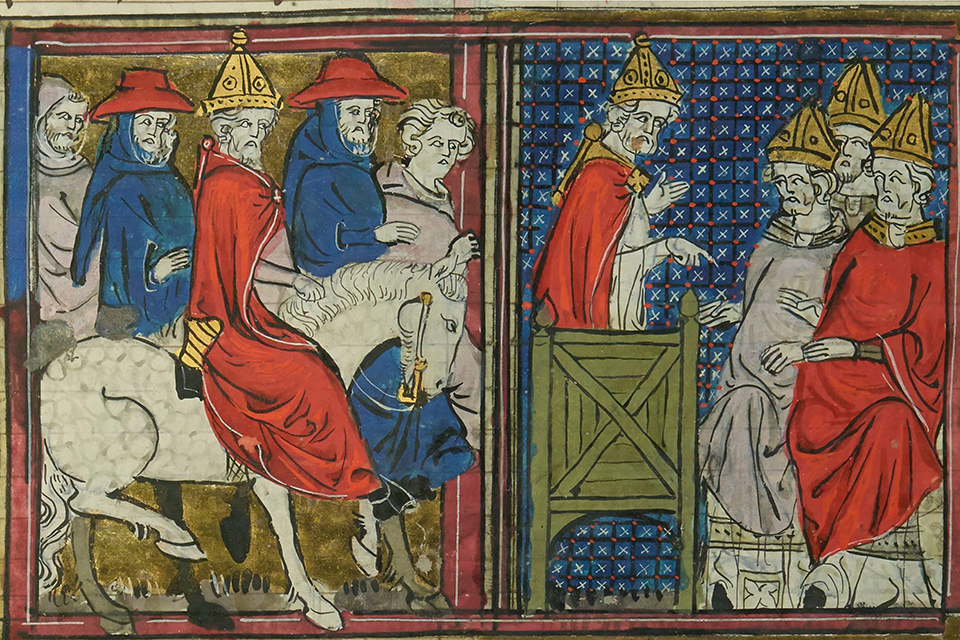Which military campaigns were propagated as crusades? How were they established as crusades? And as such: what role did crusades play in the formation of European and Christian togetherness and idetuty formation? New book offers a collection of articles presenting research on medieval crusades, their historical concepts, their course, and their social and regional range
The Expansion of the Faith
Crusading on the Frontiers of Latin Christendom in the High Middle Ages
Ed. by P. Srodecki and N. Kersken
Series: Outremer. Studies in the Crusades and the Latin East (OUTREMER 14)
Brepols 2022
ABSTRACT:
This volume offers a comparative approach to the crusade movement on the frontiers of Latin Christendom in the high Middle Ages, bringing a regional focus to research on these peripheral phenomena. It features several key questions: Which military campaigns were propagated as crusades on the peripheries of the Christian West? What efforts were made to gain recognition for them as crusades and what effects did these have? What value did the crusade movement have for societies at the fines christianitatis? What role did the cruciatae have in strengthening pan-Western sense of togetherness and solidarity, and what role did they have for creation of a crusader and frontier identity? The eighteen papers, ranging in scope from the southern and eastern Baltic regions to Iberia, Egypt and the Balkans, provide new insights into the ways in which crusade rhetoric was reflected in the culture and literature of countries involved in crusading beyond the Holy Land.
TABLE OF CONTENTS:
Introduction: Crusading on the Periphery in the High Middle Ages: Main Debates, New Approache
Paul Srodecki
Part I – Adaptation and Rejection
Why Did so few Crusaders from East-Central and Eastern Europe Participate in the Crusades to the Holy Land?
Zdzisław Pentek
The Periphery of Europe and the Idea of Crusade: Adaptation and Evolution of Crusader Ideology in Poland under the Piast Dynasty (1100–47)
Darius von Güttner-Sporzyński
Crusades and Crusading in High Medieval Dalmatia and Croatia — Failed, Abused, Imaginary
Neven Budak
Part II – Conviction and Violence
Burning of Idols — Mission and Theology around the Baltic Sea
Kurt Villads Jensen
The Crusade Idea in the Areas of the North-Western Slavs around the Time of the Second Crusade
Norbert Kersken
A North German Prince on a Pilgrimage in Arms: Political Implications of the Livonian Crusade of Albert I, Duke of Saxony
Kristjan Kaljusaar
The Role Played by Bishop Bruno of Olomouc in the Prussian Crusades of the Bohemian King Ottokar II Premislas
David Sychra
Part III – Conquest and Expansion
Die schwedischen Kreuzzüge nach Finnland aus der Ostsee-Perspektive
Jens E. Olesen
Ein folgenloser Kreuzzug? Die Herrschaftsbereiche Graf Adolfs II. von Schauenburg und des Abodritenfürsten Niklot nach dem Wendenkreuzzug von 1147
Martin Schürrer
The Conquest of the Island of Rugia, 1168/1169: A Danish Crusade?
Oliver Auge
The Battle of Las Navas de Tolosa (1212) in the Context of Ibero- Christian Conquests in al-Andalus: Myths and Models
Luis García-Guijarro
Part IV – Catholicism and Orthodoxy
Tearing Christ’s Seamless Tunic? The ‘Eastern Schism’ and Crusades against the Greeks in the Thirteenth Century
Nikolaos G. Chrissis
Between Schism and Union: Rus Adversaries and Allies of the Crusaders in the Thirteenth and Fourteenth Centuries
Anti Selart
Part V – Legitimation and Propaganda
Legitimising the Conquest of Egypt: The Frankish Campaign of 1163 Revisited
Eric Böhme
Centrality of the Periphery in Crusade Rhetoric: The Afterlife of the Crusade of Andrew II of Hungary
Nora Berend
The Rhetoric of the Crusades and Anti-Paganism in the Political Propaganda of Ottokar II Premislas of Bohemia
Robert Antonín
Fighting the ‘Eastern Plague’: Anti-Mongol Crusade Ventures in the Thirteenth Century
Paul Srodecki
ABOUT THE EDITORS:
Paul Srodecki holds a Ph.D. from Gießen University, Germany, and has also been working as an Assistant Professor, Research Fellow and Lecturer in Medieval and Eastern European History at various academic institutions, including the Universities of Kiel, Germany, and Ostrava, Czechia. He has published several treatises on the bulwark rhetoric and the defensio fidei motif in the Middle Ages and the early modern period, including the book Antemurale Christianitatis: Zur Genese der Bollwerksrhetorik im östlichen Mitteleuropa an der Schwelle vom Mittelalter zur Frühen Neuzeit (2015). He is currently working on a double volume publication in English focussing on the shield and bulwark topoi as part of the crusading movement.
Norbert Kersken holds a PhD from the University of Münster with a dissertation on medieval national historiography. He has been working as a Research and Teaching Fellow at the Herder Institute for Historical Research on East Central Europe in Marburg and at the University of Gießen, both Germany, as well as at the German Historical Institute in Warsaw, Poland. Together with Przemysław Wiszewski, he has published the monograph Neue Nachbarn in der Mitte Europas: Polen und das Reich im Mittelalter (2020).
